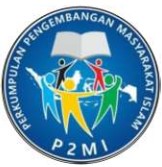Strengthening the Role of Mosques for Community Economic Empowerment
Abstract
In the face of the complexity of socio-economic challenges in the Southeast Asian region, conventional approaches often fail to reach the most vulnerable segments of society. Therefore, an empowerment model that relies on local and spiritual strengths is needed as a foundation for sustainable and contextual change. This study aims to strengthen the role of mosques in the economic empowerment of Muslim communities in Indonesia, Malaysia, and Singapore. This program uses a community participatory approach, specifically participatory action research, which involves stages such as socialization, formation of a driving team, skills training, and support for mosque-based micro and small businesses. This empowerment uses a qualitative approach with 15 participants. The results of the study showed that this program succeeded in establishing 180 new micro businesses in three countries, increasing the skills of participants by 70% and reducing the average unemployment rate by 20%. These findings imply that mosques have substantial potential as centers of economic empowerment that can improve the welfare and economic independence of Muslim communities around mosques. This model can also be adopted by other religious institutions to support community-based economic development.
Keywords
Full Text:
PDFReferences
Ahyaruddin, M., Marlina, E., Azmi, Z., Putri, A. A., Anriv, D. H., Bidin, I., & Lawita, N. F. (2017). Akuntabilitas dan transparansi pengelolaan keuangan Mesjid di Kota Pekanbaru. Jurnal Pengabdian UntukMu NegeRI, 1(1), 7-12. http://ejurnal.umri.ac.id/index.php/PengabdianUMRI/article/view/27
Al Muddatstsir, U. D., Farida, D. N., & Kismawadi, E. R. (2018). Praktik Akuntabilitas Masjid: Studi Kasus pada Masjid Al-Akbar Surabaya. Economica: Jurnal Ekonomi Islam, 9(2), 207-231. https://www.journal.walisongo.ac.id/index.php/economica/article/view/2350
Arif, M. F. (2019). Potensi Masjid Agung Trans Studio Bandung dalam Pemberdayaan Ekonomi Masyarakat Berbasis Masjid dengan Analisis SWOT. Jurnal Peradaban Dan Hukum Islam, 2(2), 79-90. https://doi.org/10.29313/tahkim.v2i2.5054
Astuty, W. (2008). Potensi Ekonomi Harta Wakaf. Jurnal Riset Akuntansi dan Bisnis, 8(2).
Basri, H., & Tabrani, M. (2014). Management and Financial Transparency of Islamic Religious Organizations The Case Study of Modern Islamic Boarding School in Contemporary Indonesia. Academic World Education & Research Center, 2, 41-49.
bin Mislan Cokrohadisumarto, W., & Sari, Y. I. (2024). Mosque-Based Integrated Community Empowerment Model. Islamic Social Finance, 4(1). https://doi.org/10.58968/isf.v4i1.372
Busri, A. Z., Suarni, A., & Wahyuni, S. (2024, December). Mosque-Based Community Empowerment: A Case Study of Muhammadiyah Mosques in Gowa Regency, South Sulawesi, Indonesia. In IECON: International Economics and Business Conference (Vol. 2, No. 2, pp. 1303-1309).
Effendi, B., & Saifudin, A. G. (2022). Optimalisasi fungsi masjid sebagai sarana dakwah dan pemberdayaan ekonomi umat. JIEF Journal of Islamic Economics and Finance, 2(2), 12-23. https://doi.org/10.28918/jief.v2i2.5989
Hardianto, M., Rachmat, A. Z., & Jasma, S. (2021). Manajemen Pemberdayaan Bidang Ekonomi di Masjid Baitul Atieq. Journal Of Lifelong Learning, 4(2), 126-132.
Hidayatulloh, M. H., Amalia, R., & Djalaluddin, A. (2024). Pemberdayaan ekonomi masyarakat berbasis masjid dalam melawan rentenir (studi masjid jami'al-umari kelayu Lombok Timur NTB). Indonesian Scientific Journal of Islamic Finance, 3(1), 56-68. https://doi.org/10.21093/inasjif.v3i1.9018
Horvat, T. (2023). Financial Planning in Non-Profit Religious Organizations. Problems of Systemic Approach in the Economy.
Mahmud, M. (2023). Penerapan Model Manajemen Keuangan Masjid Berbasis Pemberdayaan Ekonomi Umat. Mopolayio: Jurnal Pengabdian Ekonomi, 3(1), 45-57. https://doi.org/10.37479/mopolayio.v3i1.80
Mauludi, M., Ibrahim, M. S. S., Rifaid, M., & Thoha, A. F. K. (2023). Pemberdayaan Ekonomi Masyarakat Islam Berbasis Masjid (Studi Kasus Pemberdayaan Yatim Masjid Ar Rahmah Surabaya). Alhadharah: Jurnal Ilmu Dakwah, 22(1), 1-12. https://doi.org/10.18592/alhadharah.v22i1.7578
Mubarok, A. Z., & Rakhmat, A. T. (2023). Pemberdayaan Ekonomi Masyarakat Melalui Dewan Masjid Indonesia di Kabupaten Tasikmalaya. Jurnal Ilmiah Ekonomi Islam, 9(01), 755-765. doi: http://dx.doi.org/10.29040/jiei.v9i1.6961
Muslim, A. (2014). PEMBERDAYAAN EKONOMI MASYARAKAT BERBASIS MASJID Studi Kasus di Masjid Baiturrahman Klidon Sinduharjo Ngaglik Sleman. Jurnal Ilmu Dakwah, 34(2), 159-180. https://doi.org/10.21580/jid.v34.2.51
Mustain, M. (2023). Dinamika Fungsi Masjid di Indonesia: Dari Lokus Pengajaran Islam Ke Pemberdayaan Sosial Ekonomi Umat. eL-HIKMAH: Jurnal Kajian dan Penelitian Pendidikan Islam, 17(2), 109-121. https://doi.org/10.20414/elhikmah.v17i2.8998
Nizar, M., Dzikrulloh, N. Q., & Ansori, R. (2019, September). Mosque Based Economic Empowerment Model to Overcome Poverty in Indonesia. In CIFET 2019: Proceedings of the 1st Conference on Islamic Finance and Technology, CIFET (Vol. 21, p. 88).
Putri, I. F. (2023). Pemberdayaan Ekonomi Berbasis Masjid (Studi Kasus Perbandingan Masjid yang Menerapkan Pemberdayaan Ekonomi di Kota Medan) (Doctoral dissertation, UIN Sumatera Utara Medan).
Rahiem, M. D. H., & Nourwahida, C. D. (2023). Perubahan Sosial Masyarakat Kramat Tunggak Pasca Berdirinya Masjid Jakarta Islamic Centre. https://doi.org/10.29103/jspm.v4i1.10378
Sari, M., Mintarti, S., & Fitria, Y. (2018). Akuntabilitas pengelolaan keuangan organisasi keagamaan. Kinerja, 15(2), 45. https://doi.org/10.29264/jkin.v15i2.4029
Syukron, A. (2018). Implementasi Model Manajemen Strategi Dan Balanced Screcard Pada Sistem Manajemen Masjid Untuk Meningkatkan Kinerja Badan Kesejahteraan Masjid (Bkm). Ratih: Jurnal Rekayasa Teknologi Industri Hijau, 2(1), 7.
Widiastuti, T. (2015). Analisis Pemberdayaan Sosial Ekonomi di Masjid At-Taqwa. Jurnal Ekonomi Syariah Teori & Terapan, 2(10), 828-849.
Yaman, A. (2024). Mosque Economic Empowerment through Sharia Microfinance Institutions. 12 Waiheru, 10(1), 107-114.
DOI: http://dx.doi.org/10.37064/jpm.v13i1.23503
Refbacks
- There are currently no refbacks.
Copyright (c) 2025 Agus Arwani

This work is licensed under a Creative Commons Attribution-ShareAlike 4.0 International License.

